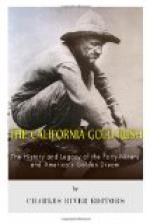Public excitement died. Conviction seemed absolutely certain. Richardson had been a public official and a popular one. Cora’s action had been cold-blooded and apparently without provocation. Nevertheless he had remained undisturbed. He had retained one of the most brilliant lawyers of the time, James McDougall. McDougall added to his staff the most able of the younger lawyers of the city. Immense sums of money were available. The source is not exactly known, but a certain Belle Cora, a prostitute afterwards married by Cora, was advancing large amounts. A man named James Casey, bound by some mysterious obligation, was active in taking up general collections. Cora lived in great luxury at the jail. He had long been a close personal friend of the sheriff and his deputy, Mulligan. When the case came to trial, Cora escaped conviction through the disagreement of the jury.
This fiasco, following King’s editorials, had a profound effect on the public mind. King took the outrage against justice as a fresh starting-point for new attacks. He assailed bitterly and fearlessly the countless abuses of the time, until at last he was recognized as a dangerous opponent by the heretofore cynically amused higher criminals. Many rumors of plots against King’s life are to be found in the detailed history of the day. Whether his final assassination was the result of one of these plots, or simply the outcome of a burst of passion, matters little. Ultimately it had its source in the ungoverned spirit of the times.
Four months after the farce of the Cora trial, on May 14, King published an attack on the appointment of a certain man to a position in the federal custom house. The candidate had happened to be involved with James P. Casey in a disgraceful election. Casey was at that time one of the supervisors. Incidental to his attack on the candidate, King wrote as follows: “It does not matter how bad a man Casey had been, or how much benefit it might be to the public to have him out of the way, we cannot accord to any one citizen the right to kill him or even beat him, without justifiable provocation. The fact that Casey has been an inmate of Sing Sing prison in New York is no offense against the laws of this State; nor is the fact of his having stuffed himself through the ballot box, as elected to the Board of Supervisors from a district where it is said he was not even a candidate, any justification for Mr. Bagley to shoot Casey, however richly the latter may deserve to have his neck stretched for such fraud on the people.”
Casey read this editorial in full knowledge that thousands of his fellow-citizens would also read it. He was at that time, in addition to his numerous political cares, editor of a small newspaper called The Sunday Times. This had been floated for the express purpose of supporting the extremists of the legalists’ party, which, as we have explained, now included the gambling and lawless element. How valuable he




